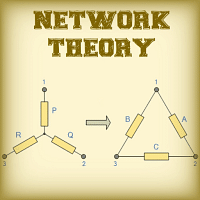Electrical Engineering (EE) Exam > Electrical Engineering (EE) Questions > The output of a continuous-time linear time-i...
Start Learning for Free
The output of a continuous-time linear time-invariant system is denoted by T{x(t)} where x(t) is the input signal A signal z(t) is called eigen-signal of the system T, when T{z(t)} = yz(t), where γ is a complex number, in general and is called an eigenvalue of T. Suppose the impulse response of the system T is real and even. Which of the following statements is TRUE?
- a)cos(t) is an eigen-signal but sin(t) is not
- b)cos(t) and sin(t) are both eigen-signals but with different eigenvalues
- c)sin(t) is an eigen-signal but cos(t) is not
- d)cos(t) and sin(t) are both eigen-signals with identical eigenvalues
Correct answer is option 'D'. Can you explain this answer?
| FREE This question is part of | Download PDF Attempt this Test |
Most Upvoted Answer
The output of a continuous-time linear time-invariant system is denote...
Y is a scalar constant.
Attention Electrical Engineering (EE) Students!
To make sure you are not studying endlessly, EduRev has designed Electrical Engineering (EE) study material, with Structured Courses, Videos, & Test Series. Plus get personalized analysis, doubt solving and improvement plans to achieve a great score in Electrical Engineering (EE).

|
Explore Courses for Electrical Engineering (EE) exam
|

|
Similar Electrical Engineering (EE) Doubts
The output of a continuous-time linear time-invariant system is denoted by T{x(t)} where x(t) is the input signal A signal z(t) is called eigen-signal of the system T, when T{z(t)} = yz(t), where γis a complex number, in general and is called an eigenvalue of T. Suppose the impulse response of the system T is real and even. Which of the following statements is TRUE?a)cos(t) is an eigen-signal but sin(t) is notb)cos(t) and sin(t) are both eigen-signals but with different eigenvaluesc)sin(t) is an eigen-signal but cos(t) is notd)cos(t) and sin(t) are both eigen-signals with identical eigenvaluesCorrect answer is option 'D'. Can you explain this answer?
Question Description
The output of a continuous-time linear time-invariant system is denoted by T{x(t)} where x(t) is the input signal A signal z(t) is called eigen-signal of the system T, when T{z(t)} = yz(t), where γis a complex number, in general and is called an eigenvalue of T. Suppose the impulse response of the system T is real and even. Which of the following statements is TRUE?a)cos(t) is an eigen-signal but sin(t) is notb)cos(t) and sin(t) are both eigen-signals but with different eigenvaluesc)sin(t) is an eigen-signal but cos(t) is notd)cos(t) and sin(t) are both eigen-signals with identical eigenvaluesCorrect answer is option 'D'. Can you explain this answer? for Electrical Engineering (EE) 2024 is part of Electrical Engineering (EE) preparation. The Question and answers have been prepared according to the Electrical Engineering (EE) exam syllabus. Information about The output of a continuous-time linear time-invariant system is denoted by T{x(t)} where x(t) is the input signal A signal z(t) is called eigen-signal of the system T, when T{z(t)} = yz(t), where γis a complex number, in general and is called an eigenvalue of T. Suppose the impulse response of the system T is real and even. Which of the following statements is TRUE?a)cos(t) is an eigen-signal but sin(t) is notb)cos(t) and sin(t) are both eigen-signals but with different eigenvaluesc)sin(t) is an eigen-signal but cos(t) is notd)cos(t) and sin(t) are both eigen-signals with identical eigenvaluesCorrect answer is option 'D'. Can you explain this answer? covers all topics & solutions for Electrical Engineering (EE) 2024 Exam. Find important definitions, questions, meanings, examples, exercises and tests below for The output of a continuous-time linear time-invariant system is denoted by T{x(t)} where x(t) is the input signal A signal z(t) is called eigen-signal of the system T, when T{z(t)} = yz(t), where γis a complex number, in general and is called an eigenvalue of T. Suppose the impulse response of the system T is real and even. Which of the following statements is TRUE?a)cos(t) is an eigen-signal but sin(t) is notb)cos(t) and sin(t) are both eigen-signals but with different eigenvaluesc)sin(t) is an eigen-signal but cos(t) is notd)cos(t) and sin(t) are both eigen-signals with identical eigenvaluesCorrect answer is option 'D'. Can you explain this answer?.
The output of a continuous-time linear time-invariant system is denoted by T{x(t)} where x(t) is the input signal A signal z(t) is called eigen-signal of the system T, when T{z(t)} = yz(t), where γis a complex number, in general and is called an eigenvalue of T. Suppose the impulse response of the system T is real and even. Which of the following statements is TRUE?a)cos(t) is an eigen-signal but sin(t) is notb)cos(t) and sin(t) are both eigen-signals but with different eigenvaluesc)sin(t) is an eigen-signal but cos(t) is notd)cos(t) and sin(t) are both eigen-signals with identical eigenvaluesCorrect answer is option 'D'. Can you explain this answer? for Electrical Engineering (EE) 2024 is part of Electrical Engineering (EE) preparation. The Question and answers have been prepared according to the Electrical Engineering (EE) exam syllabus. Information about The output of a continuous-time linear time-invariant system is denoted by T{x(t)} where x(t) is the input signal A signal z(t) is called eigen-signal of the system T, when T{z(t)} = yz(t), where γis a complex number, in general and is called an eigenvalue of T. Suppose the impulse response of the system T is real and even. Which of the following statements is TRUE?a)cos(t) is an eigen-signal but sin(t) is notb)cos(t) and sin(t) are both eigen-signals but with different eigenvaluesc)sin(t) is an eigen-signal but cos(t) is notd)cos(t) and sin(t) are both eigen-signals with identical eigenvaluesCorrect answer is option 'D'. Can you explain this answer? covers all topics & solutions for Electrical Engineering (EE) 2024 Exam. Find important definitions, questions, meanings, examples, exercises and tests below for The output of a continuous-time linear time-invariant system is denoted by T{x(t)} where x(t) is the input signal A signal z(t) is called eigen-signal of the system T, when T{z(t)} = yz(t), where γis a complex number, in general and is called an eigenvalue of T. Suppose the impulse response of the system T is real and even. Which of the following statements is TRUE?a)cos(t) is an eigen-signal but sin(t) is notb)cos(t) and sin(t) are both eigen-signals but with different eigenvaluesc)sin(t) is an eigen-signal but cos(t) is notd)cos(t) and sin(t) are both eigen-signals with identical eigenvaluesCorrect answer is option 'D'. Can you explain this answer?.
Solutions for The output of a continuous-time linear time-invariant system is denoted by T{x(t)} where x(t) is the input signal A signal z(t) is called eigen-signal of the system T, when T{z(t)} = yz(t), where γis a complex number, in general and is called an eigenvalue of T. Suppose the impulse response of the system T is real and even. Which of the following statements is TRUE?a)cos(t) is an eigen-signal but sin(t) is notb)cos(t) and sin(t) are both eigen-signals but with different eigenvaluesc)sin(t) is an eigen-signal but cos(t) is notd)cos(t) and sin(t) are both eigen-signals with identical eigenvaluesCorrect answer is option 'D'. Can you explain this answer? in English & in Hindi are available as part of our courses for Electrical Engineering (EE).
Download more important topics, notes, lectures and mock test series for Electrical Engineering (EE) Exam by signing up for free.
Here you can find the meaning of The output of a continuous-time linear time-invariant system is denoted by T{x(t)} where x(t) is the input signal A signal z(t) is called eigen-signal of the system T, when T{z(t)} = yz(t), where γis a complex number, in general and is called an eigenvalue of T. Suppose the impulse response of the system T is real and even. Which of the following statements is TRUE?a)cos(t) is an eigen-signal but sin(t) is notb)cos(t) and sin(t) are both eigen-signals but with different eigenvaluesc)sin(t) is an eigen-signal but cos(t) is notd)cos(t) and sin(t) are both eigen-signals with identical eigenvaluesCorrect answer is option 'D'. Can you explain this answer? defined & explained in the simplest way possible. Besides giving the explanation of
The output of a continuous-time linear time-invariant system is denoted by T{x(t)} where x(t) is the input signal A signal z(t) is called eigen-signal of the system T, when T{z(t)} = yz(t), where γis a complex number, in general and is called an eigenvalue of T. Suppose the impulse response of the system T is real and even. Which of the following statements is TRUE?a)cos(t) is an eigen-signal but sin(t) is notb)cos(t) and sin(t) are both eigen-signals but with different eigenvaluesc)sin(t) is an eigen-signal but cos(t) is notd)cos(t) and sin(t) are both eigen-signals with identical eigenvaluesCorrect answer is option 'D'. Can you explain this answer?, a detailed solution for The output of a continuous-time linear time-invariant system is denoted by T{x(t)} where x(t) is the input signal A signal z(t) is called eigen-signal of the system T, when T{z(t)} = yz(t), where γis a complex number, in general and is called an eigenvalue of T. Suppose the impulse response of the system T is real and even. Which of the following statements is TRUE?a)cos(t) is an eigen-signal but sin(t) is notb)cos(t) and sin(t) are both eigen-signals but with different eigenvaluesc)sin(t) is an eigen-signal but cos(t) is notd)cos(t) and sin(t) are both eigen-signals with identical eigenvaluesCorrect answer is option 'D'. Can you explain this answer? has been provided alongside types of The output of a continuous-time linear time-invariant system is denoted by T{x(t)} where x(t) is the input signal A signal z(t) is called eigen-signal of the system T, when T{z(t)} = yz(t), where γis a complex number, in general and is called an eigenvalue of T. Suppose the impulse response of the system T is real and even. Which of the following statements is TRUE?a)cos(t) is an eigen-signal but sin(t) is notb)cos(t) and sin(t) are both eigen-signals but with different eigenvaluesc)sin(t) is an eigen-signal but cos(t) is notd)cos(t) and sin(t) are both eigen-signals with identical eigenvaluesCorrect answer is option 'D'. Can you explain this answer? theory, EduRev gives you an
ample number of questions to practice The output of a continuous-time linear time-invariant system is denoted by T{x(t)} where x(t) is the input signal A signal z(t) is called eigen-signal of the system T, when T{z(t)} = yz(t), where γis a complex number, in general and is called an eigenvalue of T. Suppose the impulse response of the system T is real and even. Which of the following statements is TRUE?a)cos(t) is an eigen-signal but sin(t) is notb)cos(t) and sin(t) are both eigen-signals but with different eigenvaluesc)sin(t) is an eigen-signal but cos(t) is notd)cos(t) and sin(t) are both eigen-signals with identical eigenvaluesCorrect answer is option 'D'. Can you explain this answer? tests, examples and also practice Electrical Engineering (EE) tests.

|
Explore Courses for Electrical Engineering (EE) exam
|

|
Suggested Free Tests
Signup for Free!
Signup to see your scores go up within 7 days! Learn & Practice with 1000+ FREE Notes, Videos & Tests.
























